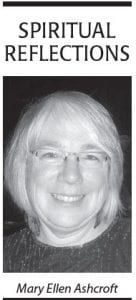When I was in school, we had to choose—art or music? I chose music and so I’d never done any drawing or painting. Then a friend gave me a wonderful birthday present: a drawing class at the Art Colony. As we began to draw, I realized that there were many things I had never seen. Not only had I not seen them—I didn’t even know I wasn’t seeing them. Patterned tree trunks, lines in faces, shadows of rocks: how could I possibly have lived 59 years and not known how blind I was?
Perhaps if we saw and heard everything it would overwhelm us. In her great novel, Middlemarch, George Eliot writes, “If we had a keen vision and feeling of all ordinary human life, it would be like hearing the grass grow and the squirrel’s heart beat, and we should die of that roar which lies on the other side of silence. As it is, the quickest of us walk about well wadded with stupidity.”
Blind and “well wadded with stupidity”—what a way to live our short lives in this amazing world. How can we see more? How can we become “all ears”?
The answer is to live expectantly.
Backpacking for years in the North Cascades I never saw any wildlife. Then when my son and I arrived for a three-day backpack, there was a sign at the Trailhead: LOST DOG. During those next few days we did not find the lost dog, but we saw a bear, a wolverine, a fox, and other creatures. Were my familiar mountains suddenly filled with an infestation of animals? No. It was rather that I was looking expectantly. Expecting to see a dog, I saw lots of other things.
When we are expectant— thinking this conversation might be significant, this path lovely, this silence meaningful—they often are. Researchers studying how teacher expectations affect student learning gave first grade teachers a list of the “gifted” students in their classroom—randomly chosen from the class list. The so-called “gifted” children excelled while the “normal” ones scraped along. The teachers’ expectations produced real results.
I believe this idea of expectation is a lot like faith.
What helps raise our expectation? 1. Opportunity: A group of people can inspire expectation in each other. This last year I hosted a women’s spirituality group at WindCradle. Each evening, one person told of an encounter with the divine. Just as my drawing class helped me to see, in that gathering we “heard each person into speech.” We knew we would hear a story about a God encounter— on a bus, in an ICU, after a car accident—and our expectations of other sacred meetings grew. 2. On the negative side, fear closes down expectation. Maybe that’s why Jesus said (more than he said anything else), “Don’t be afraid.” “Be at peace.” When we are not afraid, when we are at peace, we are able to see and hear things we might otherwise completely miss. 3. A theology of abundance: If we believe in a good God who has created a good world, we are more likely to be open to the world around us, more prone to be “all ears.”
In God’s Grandeur, Gerard Manley Hopkins writes about seeing God in dappled things:
“skies of couple color as a brinded cow rose moles all in stipple upon trout that swim fresh fire coal chestnut falls, finches wings landscape plotted and pieced— fold, fallow, and plow and all trades—their gear and tackle and trim…”
Where might we expect a divine encounter? As we become “all ears” and open our eyes, we might like Hopkins see the sacred—in the sky, in birds, in a bonfire, in trout, in fishing tackle—almost anywhere.
In another poem (Inversnaid) Hopkins speaks of other God sightings in kingfishers, dragonflies and stones, and then summarizes: “Christ plays in ten thousand places, Lovely in limbs, and lovely in eyes not his….”
As we let go of fear, become expectant and attentive, find opportunities to grow—we will meet Christ in ten thousand places and encounter him “lovely in eyes not his.” If our view of God is big enough, God is everywhere seeking us, and wanting to dazzle us.
Each month a member of the Cook County Ministerium will offer Spiritual Reflections. This month’s s contributor is Mary Ellen Ashcroft, Vicar of Spirit of the Wilderness Episcopal Church.



Loading Comments